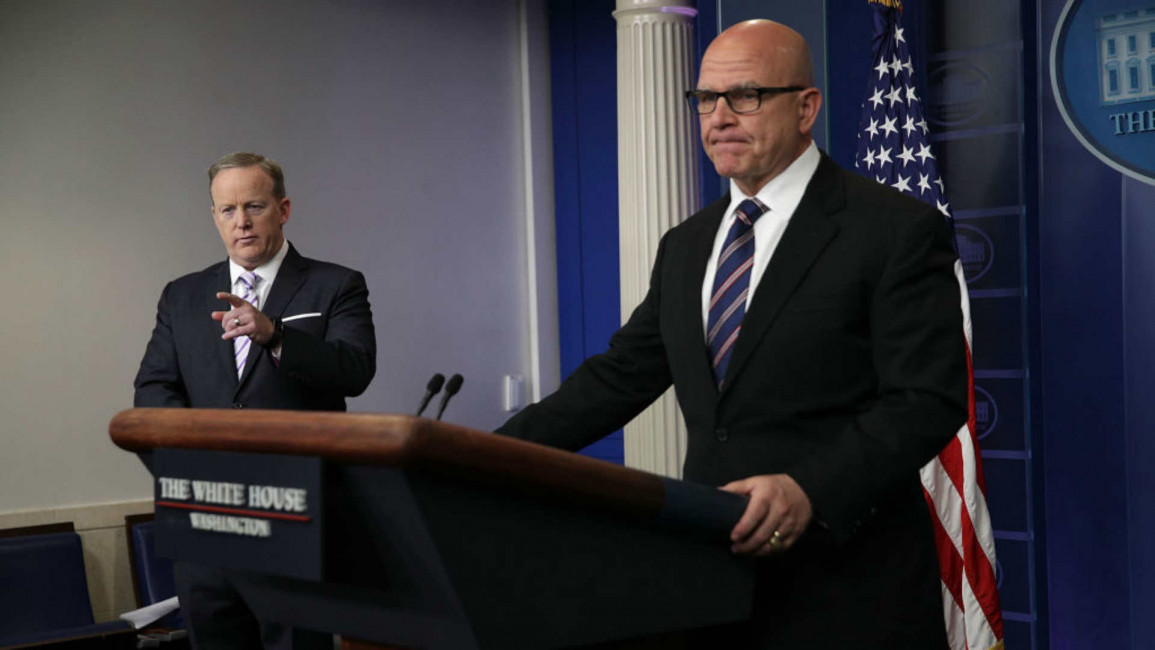
What's going on inside Trump's National Security Council?
The allegations that President Trump had shared classified information with Russians have led to a storm of controversy in Washington, causing the White House to investigate potential leakers within the administration.
Not long ago, the National Security Adviser Lt. Gen. H.R. McMaster was presented with a list of individuals to fire. They were allegedly "Obama holdovers at the National Security Council who were suspected of leaking to the press."
McMaster - who replaced Michael Flynn after revelations of Flynn's controversial links with Russia - rejected the idea. It is no secret that McMaster has been under systematic attack by close associates of Trump's chief strategist Steve Bannon, as have Flynn's network, who kept their positions inside the White House.
McMaster's opponents have recently leaked to reporters details about tensions between President Trump and Gen. McMaster, portraying the General as "dangerously obsessed" with nation-building projects in the Middle East.
McMaster's new proposal to surge troops in Afghanistan presented an opportunity to his adversaries: He was criticised for allegedly supporting troop surge in Iraq a decade ago, and depicted as militaristic in his vision - ironically, by the very alt-right media that drives "the Muslim travel ban" policy.
 |
Behind the hate for McMaster, however, lies a power struggle to shape the Trump administration's Middle East policy |  |
Behind the hate for McMaster, however, lies a power struggle to shape the Trump administration's Middle East policy. McMaster supports an engagement policy in the region. Shortly after assuming his role as the national security adviser, McMaster pleaded with Trump not to use phrase "radical Islamic terrorism" in the president's major speech to Congress.
Moreover, he sent memos to branches of the government criticising a draft of that speech for inclusion of the phrase. Trump ignored McMaster's suggestion. It was a clear victory for associates of Bannon (called Bannonites in DC circles) including Sebastian Gorka, a fringe figure whose notorious Islamophobic views helped him to receive an office in the White House as deputy assistant to the president.
| Read more: Could Comey's dismissal mark the beginning of Trump's end? | |
McMaster's belief in American soft power was most evident in his recent press briefing on Trump's upcoming first overseas visit to the Middle East. Declaring that President Trump "understands that America First does not mean America alone" and aims to give a unity message "to the faithful of three of the world's greatest religions" and a message to "express his support for the Palestinian people's aspirations for self-determination," McMaster scored points in a tug of war with Bannonites to interpret, and thus, shape Trump's foreign policy.
White nationalist outlets were swift to claim that McMaster is trying to re-orient the National Security Council along Obama's lines. Whether or not this is true, there is no doubt that McMaster's choice of words in the press briefing was reminiscent of Obama's White House briefs, calling on Muslim world leaders to "promote a peaceful vision of Islam" against a "perverted interpretation of religion" that "has inflicted so much suffering throughout the Muslim world and beyond".
 |
White nationalist outlets were swift to claim that McMaster is trying to re-orient the National Security Council along Obama's lines |  |
McMaster will likely try to shape Trump's planned speech on a "peaceful vision of Islam" in Saudi Arabia, being written by Stephen Miller, one of the architects of the "Muslim ban".
McMaster's recent hires to the White House also reflect his vision to prioritise engaging diplomacy. Nadia Schadlow joined McMaster's staff as deputy assistant to the president for writing national security strategy. Schadlow's recent book, War and the Art of Governance: Consolidating Combat Success into Political Victory, gives some indication of how she perceives US involvement in the Middle East.
Examining the history of American wars from Mexico to Iraq, Schadlow criticises battlefield gains that were not translated into long-term successes owing to diplomatic inability and failures in post-conflict governance. Schadlow believes that lessons of the past have been constantly ignored by new administrations, referring to this as "American denial syndrome".
As the Trump administration effectively sidelined the State Department in shaping the strategic decisions, McMaster's team for engagement diplomacy with the Muslim world may have a critical significance. A shrinking State Department, however, also means the challenges in McMaster's path will continue to grow.
 |
Tensions inside the National Security Council are poised to increase |  |
Although McMaster as a hawkish general appears to be a propaganda campaign, his adversarial views on Russia and Iran may limit his diplomacy work, aligning him with Secretary of Defense James "Mad Dog" Mattis, whose combative discourse has been controversial.
General Mattis is known to make comments such as "you go into Afghanistan, you got guys who slap women around for five years because they did not wear a veil," and "you know, guys like that ain't got no manhood left anyway. So it's a hell of a lot of fun to shoot them". Nonetheless, a McMaster-Mattis hardline on Iran may even encourage an engaging diplomacy with the wider Arab world.
In the wake of the recent - and perhaps the most serious- Trump-Russia controversy, tensions inside the National Security Council are poised to increase and will have wide-reaching implications for the Trump administration's Middle East policy, for better or for worse.
Dr. Mustafa Gurbuz is a Middle East Analyst at Arab Center Washington DC and teaches in the Arab World Studies program at American University.
Follow him on Twitter: @Mustafa__Gurbuz
Opinions expressed in this article remain those of the author and do not necessarily represent those of The New Arab, its editorial board or staff.




